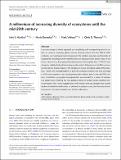A millennium of increasing diversity of ecosystems until the mid‐20th century
Abstract
Land-use change is widely regarded as a simplifying and homogenising force in nature. In contrast, analysing global land-use reconstructions from the 10th to 20th centuries, we found progressive increases in the number, evenness, and diversity of ecosystems (including human-modified land-use types) present across most of the Earth’s land surface. Ecosystem diversity increased more rapidly after ~1700CE, then slowed or slightly declined (depending on the metric) following the mid-20th century acceleration of human impacts. The results also reveal increasing spatial differentiation, rather than homogenisation, in both the presence-absence and area-coverage of different ecosystem types at sub-global scales - at least, prior to the mid-20th century. Nonetheless, geographic homogenization was revealed for a subset of analyses at a global scale, reflecting the now-global presence of certain human-modified ecosystem types. Our results suggest that, while human land-use changes have caused declines in relatively undisturbed or ‘primary’ ecosystem types, they have also driven increases in ecosystem diversity over the last millennium.
Citation
Santos Martins , I , Dornelas , M , Vellend , M & Thomas , C D 2022 , ' A millennium of increasing diversity of ecosystems until the mid‐20th century ' , Global Change Biology , vol. Early View . https://doi.org/10.1111/gcb.16335
Publication
Global Change Biology
Status
Peer reviewed
ISSN
1354-1013Type
Journal article
Description
Funding: Horizon Europe Marie Sklodowska-Curie Actions (Grant Number(s): 894644); Natural Sciences and Engineering Research Council of Canada; Leverhulme Centre for Anthropocene Biodiversity (Grant Number(s): RC-2018-021).Collections
Items in the St Andrews Research Repository are protected by copyright, with all rights reserved, unless otherwise indicated.

